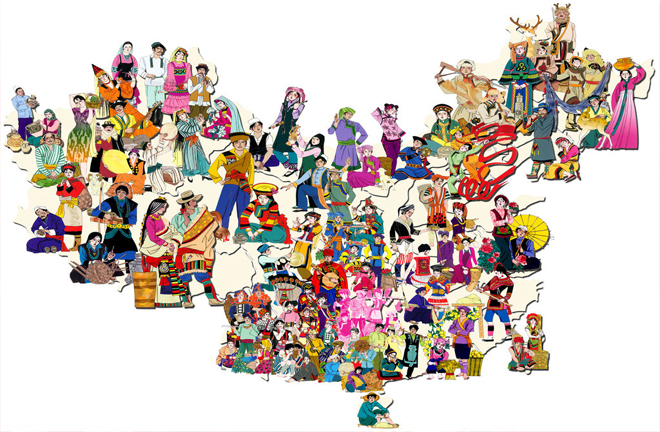Protecting languages of ethnic groups

When promoting Chinese Mandarin, we must also strive to support the development of languages of all ethnic groups. Photo: FILE
China is a multi-ethnic country with more than 100 languages from five major language families, including the Sino-Tibetan, Altaic, Austronesian, Austro-Asiatic and Indo-European. It is essential to protect linguistic diversity and promote the sustainable development of language resources.
Language is the foundation of human culture, the symbol of a nation, and an important factor of cultural exchange. Li Yuming, director of the Beijing Advanced Innovation Center for Language Resources at Beijing Language and Culture University, said that due to the development of world politics and economies, and the influence of various natural and man-made factors, world language resources are attenuating at an alarming rate. After a language dies out, the culture and knowledge that has been passed down from generation to generation through this language may disappear. The loss implied by this will be irreparable for mankind.
China has been attaching great importance to protecting linguistic diversity and the rights of all ethnic groups to use their own languages. In recent years, China has focused on the protection of language resources and carried out extensive language protection projects nationwide.
Wang Feng, a research fellow at the Institute of Ethnology and Anthropology under the Chinese Academy at Social Sciences, said that the right of all ethnic groups to use their own languages is guaranteed in the Chinese Constitution, which is the political and legal basis for the protection of linguistic diversity in China. Since the 1990s, the linguistic community has been aware of the problem of endangered languages and has actively called for protection measures. Through extensive efforts in the academic community, the concept of linguistic diversity has gradually been internalized.
Zhong Jinwen, dean of the School of Literature, Journalism and Communication at Minzu University of China, said that at present, the government at all levels has made great efforts to protect linguistic diversity and has achieved remarkable results. However, due to the rapid development of the social economy and general informatization, and intensive cross-linguistic exchanges among people, the languages and cultures of many ethnic groups are becoming increasingly endangered. Some ethnic groups with small populations have only a handful of inheritors who can speak their own languages, and most people eventually switch to Standard Chinese Mandarin. There is no contradiction between the promotion of Mandarin Chinese and the protection of language diversity. Promoting the national common language can promote the economic and cultural exchanges between different ethnic groups and regions, helping maintain national unity and dignity.
Liu Dan, director of the Institute of Linguistics at the Chinese Academy of Social Sciences, said that language is not passed down by teaching at school but naturally obtained through intergenerational transmission and peer communication in childhood. In addition, language policies should be adjusted to local conditions. For example, in poor rural areas, we can further promote the use of Mandarin Chinese to enhance the ability of the masses and young people to integrate into the economic environment. In areas inhabited by some ethnic groups where Mandarin Chinese is still not in common use, we should also improve the popularity of the common language. In areas with a high usage rate of Mandarin Chinese and declining use of dialects, it is important to appropriately adjust the language policy and encourage the use of dialects between families, relatives and friends.
To better protect linguistic diversity, efforts should be made to improve language confidence. We can help speakers of different languages see the value of their languages and enhance their enthusiasm to preserve them. The protection of linguistic diversity should be actively combined with the protection of intangible cultural heritage. This means we must attract young people to intangible cultural heritage and endangered languages. In addition, we must actively create a cultural environment that is conducive to the development of linguistic diversity. We should give full play to social and cultural influencing in the fields of broadcasting, television, film and education and carry out targeted work to protect linguistic diversity, Wang said.
edited by YANG LANLAN

 PRINT
PRINT CLOSE
CLOSE